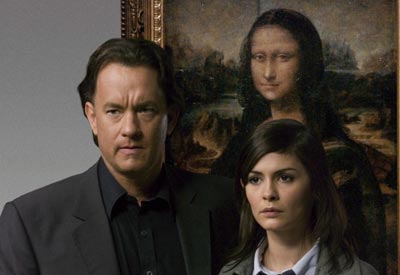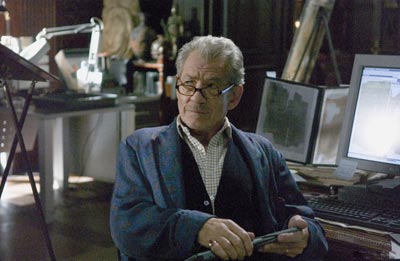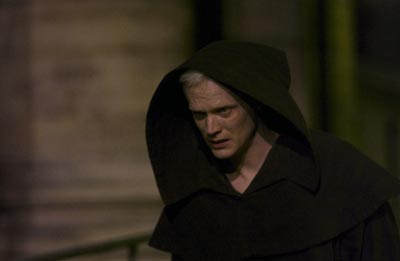The Da Vinci Code
Dreary, silly, poorly worded and often ludicrous. Just like the book, in fact.

Surely, given the parlance of our times, the 'The' in 'The Da Vinci' code is unnecessary? Using 'Da Vinci Code' would give a welcome and achingly trendy gloss of gangsta-ism to the piece, and to be honest, might have made things a little more interesting. Alternatively, 'Dada Vinci Code' could have been a masterwork of surrealist beauty, although true to the art movement's spirit this film has wound up more like a boot stamping on cinema's face, forever.
For those amongst us who have been living in a cave on the moon for the past few years, Dan Brown's novel The Da Vinci Code became a modern publishing phenomenon whose popularity and sales figures were bettered only by the Harry Potter Hegemony. In common with the boy wizard, it's a bloody awful, clumsily worded mess with excruciatingly silly and convoluted plot developments that, somehow, manages to keep your attention over it's needlessly drawn-out narrative when there's any number of more worthy novels competing for your dollarpound. That this would be picked up for a movie version was inevitable. That this would be hyped to the rafters was inevitable. That the Psycho-Christians would be up in arms about it (more so now, because it's a movie now and therefore more true. Or something) was inevitable. Sadly, given the fairly faithful adaptation Akiva Goldman has presented Ron Howard to direct, the fact that it would be a ill-conceived, drawn out waste of time was also inevitable.
For our moon-dwelling troglodytes, The Da Vinci Code speaks of a murder in the Louvre, the curator found dead with a bullet in his gut and a strange number of ritualistic mutilations and a message scrawled in his own blood seemingly implicating a Robert Langdon (Tom Hanks), American religious symbology expert. Invited to the scene of the crime by Captain Fache (Jean Reno) to 'help', in this case meaning 'wheedle confession out of', Langdon is whisked away from the scene by a young cryptologist Sophie Neveu (Audrey Tautou), who realises the true intent of the message and remains remarkably calm about the whole affair given that the victim in this case is her grandfather.

This true message leads to a treasure hunt of clues around Paris and eventually London revolving around secret societies, the Knights Templar (it's always the bloody Knights Templar. They seem to have the monopoly on conspiracy theories. Hmm. It's a conspiracy!), Church sponsored cover-ups and murders, 'Council of Shadows', hyper-strict religious orders and the vast secret of the Holy Grail and what it really means, all of which you're more than likely aware of given the media Blitzkrieg that accompanies this release, but let's leave the convoluted surprise for those that have somehow managed to avoid hearing it, eh?
What this means for us is Langdon and Neveu being chased around by Fache's forces as well as a self-flagellating albino killer from the Opus Dei order, Silas (Paul Bettany), charged by a mysterious Teacher to bury this Grail story once and for all, while our dynamic duo pick up help from crippled Grail folklore expert Sir Leigh Teabing (Ian Magneto. Sorry, McKellen). Well, if it had any sense in the adaptation it would have been Langdon and Neveu being breathlessly chased around Paris and London etc, etc.
Instead, it's a lot of people sitting around talking for an hour, an incredibly brief and ludicrously awful car chase, people sitting around talking for two hours, another thrill-free flight and then people standing around talking for another four hours. Does that sound like the makings of a genre-defining thriller to you? Okay, okay, the film's only two and a quarter hours or so long, but in relative terms it feels a helluva lot longer. Truly, the bulk of The Da Vinci Code is spent relating reams of Grail history and elucidating various crackpot conspiracy theories, which if you're going for the full-fat, by-the-book adaptation method is unavoidable. It's not advisable, however, and as a direct result this movie just drags its heels along a quagmire of exposition that sucks it down, making the film itself suck. There's at least three-quarters of an hour of narrative fat that needs liposuction, the sort which can be excused in a novel as it's naturally a far less visual medium. There's nothing wrong with vast reams of dialogue in principle but it has to be intriguing and has to fit in with building momentum towards a climax, whereas all too often The Da Vinci Code grinds to a stuttering halt. Even in the final reels when the SHOCKING PLOT TWISTS OF EXTREME SHOCKINGNESS are being pebble-dashed against the screen by the minute, there's no real interest generated by them and only the vaguest sense of climax, which turns out to be pre-mature as it trundles along for another half-hour of interminable denouement and epilogue.

In all honesty, you couldn't make a truly great film out of The Da Vinci Code even if it was handled perfectly, simply because the source material isn't strong enough. In fact, it's a poorly conceived bunkum, but on reading it I could imagine a relatively diverting thriller dropping out of it if the screenwriter had the sense to cut out swathes of the sillier, lengthier waffle. Then again, this is the writer of Batman & Robin we're talking about. Perhaps it's actually a masterstroke on Howard's part - anyone wishing to protest about the thematic content of this film will be so stultified by the end of having seen it they'll be too numbed to care much about it. Shame it takes it out on the rest of the audience as well. Something's not right with this film. The only real action that you can get away with in near enough the first half of the book is the car chase in Paris, and why it's so anaemic and botched is just baffling. It's not as if there weren't enough templates to crib from by this point in time.
Negative as I'm being, The Da Vinci Code isn't a completely terrible film. There's been enough money and talent thrown at it that some of it sticks. Some of Howard's work on blending vistas of present and past locations turns out to be rather effective, particularly the entrance to Temple Church in London. Quite why other flashbacks to people's memories have to be done in bleach bypass super-grain-o-vision like some eighth generation VHS copy is another thing, however. No-one's really bad in any of their roles, albeit many miles away from troubling the Oscar judges. Bettany manages a menace to his, frankly, silly character with a fine physical performance that we wouldn't have expected of him but McKellen in particular is the real star. The film really only shows any signs of life when he's on the screen, with a fine, good-humoured, scenery-chewing performance that's the best thing in the film by far. Audrey Tautou is extraordinarily pretty and likable as ever, with Hanks largely on autopilot. Oh, and Jean Reno knocks the stuffing out of a French air traffic controller, which is always a bonus in any film. All of the above drag The Da Vinci Code kicking and screaming up from being a terrible film to merely being a very, very dull one.
For all of the hue and cry, there's nothing controversial about this hodge-podge of half-baked, quarter-baked and completely uncooked conspiracies, suppositions and leaps of faith. Despite what the opening chapter of Dan Brown's book claims, everything here is not a fact by the greatest stretch of the imagination. Honestly, if anything in here shakes your faith then I hate to break it to ya, buster, but you didn't believe in the first place. There's nothing outrageous in here, unless you count the bits that are outrageously dreary. Honestly, you'd be better off playing Broken Sword: Shadow of the Templars instead.
Were I in the business of passing quantifiable judgements, I'd award this 2/5 TippyMarks.
Audrey Tautou (Sophie Neveu)
Ian McKellen (Sir Leigh Teabing)
Jean Reno (Captain Fache)
Paul Bettany (Silas)
Alfred Molina (Bishop Aringarosa)